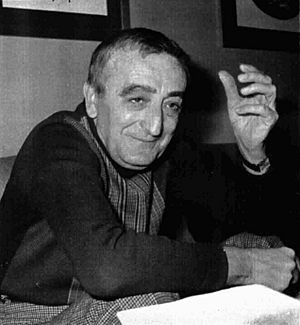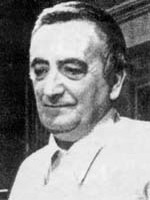Mario Bava facts for kids
Quick facts for kids
Mario Bava
|
|
|---|---|

Bava in 1975
|
|
| Born | 31 July 1914 Sanremo, Kingdom of Italy
|
| Died | 27 April 1980 (aged 65) Rome, Italy
|
| Other names | John M. Old John Foam |
| Occupation | Film director, cinematographer, special effects artist, screenwriter |
| Children | Lamberto Bava |
| Parent(s) | Eugenio Bava |
Mario Bava (born July 31, 1914 – died April 27, 1980) was a famous Italian filmmaker. He did many jobs in movies, like directing, taking pictures (cinematography), creating special effects, and writing stories. People often called him the "Master of Italian Horror" or the "Master of the Macabre." This means he was really good at making scary and mysterious films.
His movies were often made with a small budget. But they were known for their amazing looks and clever technical tricks. Bava's films often explored ideas about what is real and what is just an illusion. They also looked at the darker side of human nature. He was a pioneer in Italian genre cinema. Many people see him as one of the most important creators in the horror film genre.
After helping with special effects on movies like Hercules (1958), Bava directed his first full movie. It was a horror film called Black Sunday, released in 1960. He then directed many other films. Some famous ones include The Girl Who Knew Too Much, Black Sabbath, and Blood and Black Lace.
The British Film Institute said that Bava played a key role in creating modern horror movies. They even suggested he should be honored alongside other great directors. These include Alfred Hitchcock, Georges Franju, and Michael Powell.
Contents
Family and Early Life
Mario Bava's father was Eugenio Bava. He was a sculptor, a cinematographer, and a pioneer in special effects. Mario followed his father into the film world. He became known as one of Italy's best cameramen. He also created lighting and special effects for many films. These included Hercules (1958) and its sequel Hercules Unchained (1959).
Mario Bava's son, Lamberto Bava, often worked as his assistant director. Lamberto later became a well-known director of fantasy and horror films himself.
Becoming a Filmmaker
Mario Bava was born in Sanremo, Italy, on July 31, 1914. His father, Eugenio Bava, worked in the Italian silent movie industry. Mario first wanted to be a painter. But he found it hard to make enough money from painting. So, he joined his father's business. He worked as an assistant to other Italian cinematographers. He also helped his father with special effects at the Istituto Luce film factory.
Bava became a cinematographer in 1939. He shot two short films with Roberto Rossellini. He started working on full-length movies in the early 1940s. Bava's camera work was very important in showing the personalities of stars like Gina Lollobrigida and Steve Reeves.
In the late 1950s, Bava started to direct films. He was often asked to finish projects that other directors had started. For example, he worked on I Vampiri (1957). This was the first Italian horror film with sound. He also helped with The Day the Sky Exploded (1958), the first Italian science fiction film. He also worked on Caltiki – The Immortal Monster (1959).
Bava worked on I vampiri in 1956. He was the cinematographer, but the original director left. Bava finished the film in just a few days. He even created the special effects needed. He also did the camera work and special effects for the 1955 film Ulysses. He also worked on the 1957 film Hercules. These two films helped start the Italian "sword and sandal" movie style.
In 1960, Bava directed Black Sunday. This was his first movie directed all by himself. It made Barbara Steele a horror star. Bava was praised for how he used light and dark in his black-and-white films. He was also known for his amazing use of color in movies like Black Sabbath and Blood and Black Lace.
Later Films and Influence
Mario Bava's films have had a big impact on other directors. He directed two of the first Italian giallo films. These are a type of mystery-thriller movie. They were The Girl Who Knew Too Much (1963) and Blood and Black Lace (1964). His 1965 science fiction horror film Planet of the Vampires was similar to the later famous movie Alien (1979).
Bava's film Danger: Diabolik (1968) brought a more grown-up feel to comic book movies. It was inspired by Pop art artists like Andy Warhol. Many parts of his 1966 film Kill, Baby... Kill! also show up in Japanese horror films. The 1971 movie A Bay of Blood is seen as one of the first slasher films. It was even copied in Friday the 13th Part 2.
Bava was sometimes unhappy with how his later films were released. His movie Lisa and the Devil (1972) struggled to find a distributor. To get it released, the producer changed it. They added new scenes and called it House of Exorcism. Bava's film Semaforo Rosso (1974) was not released in theaters during his lifetime. It was later changed and released on video as Rabid Dogs.
In 1977, Bava directed his last horror film, Shock. His son, Lamberto Bava, helped direct it without being credited. Mario Bava later worked on special effects for Dario Argento's 1980 film Inferno. Bava died suddenly from a heart attack on April 27, 1980, at age 65. He was about to start a new science fiction film called Star Riders.
Influence and Legacy
Even though many of Bava's films didn't make a lot of money when they first came out, they later became very popular. They are now seen as "cult classics." People often compare their quality to the films of Alfred Hitchcock. Bava was a very talented artist, but he was shy. This meant he didn't always take chances that could have made him more famous around the world. He even turned down chances to work in Hollywood.
Mario Bava's son, Lamberto Bava, worked as his assistant director for 14 years. He then became a horror film director himself. Mario Bava sometimes used the name John M. Old for his credits. Later, Lamberto was sometimes called John M. Old, Jr. When Lamberto showed his first solo film, Macabre, to his father in 1980, Mario joked, "I am very proud of you. Now I can die in peace." He passed away less than two months later.
A documentary about him called Mario Bava: Maestro of the Macabre was released in 2000.
Many famous directors have been influenced by Mario Bava's style. These include Joe Dante, Martin Scorsese, Quentin Tarantino, Francis Ford Coppola, John Landis, and Tim Burton. Other directors like Dario Argento, Lucio Fulci, and John Carpenter also learned from Bava's work.
The TV show Mystery Science Theater 3000 ended its series in 1999 with a spoof of Bava's film Danger: Diabolik.
See also
 In Spanish: Mario Bava para niños
In Spanish: Mario Bava para niños
- European art cinema
- Exploitation film
- Cinema of Italy
 | Georgia Louise Harris Brown |
 | Julian Abele |
 | Norma Merrick Sklarek |
 | William Sidney Pittman |


